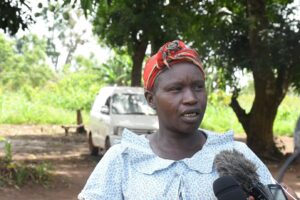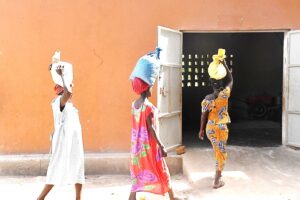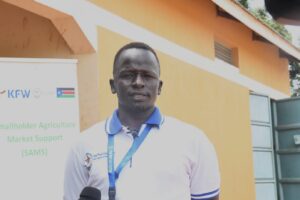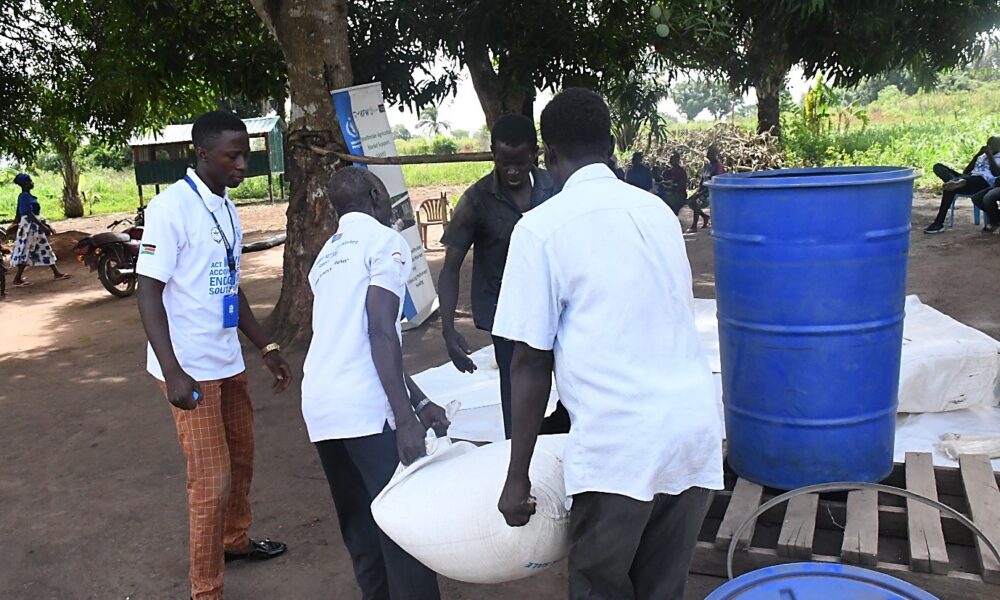By William Madouk
In Yambio County, Western Equatoria State, there is Saura-two village with its charming beauty and classy vegetation, which gives it a fascinating natural beauty for visitors and residents.
However, the smallholder farmers had been tilling land using traditional methods in their farming activities, which yielded poor or meagre harvests that could not sustain households for long.
With its virgin fertile soil, the Suara area is a mass of grand land that could be a food basket for the state and South Sudan at large.
That compelled the World Food Programme to team up with agriculture experts to offer value-adding and post-harvest technique training to smallholder farmers, a move aimed at increasing productivity and household incomes.
Farmers now embark on a journey with high hopes of revolutionizing agriculture and hitting bumper harvests, aiming to alleviate the country from the shackles of food insecurity while earning money.

No. 1 Citizen Daily Newspaper met up with Ms. Josephine Anthony, a mother to 12 kids who is also a farmer, and narrated the challenges that women faced before a grinding mill was fixed in the area.
For example, she said women and young girls could use bicycles or trek 15 kilometres to Yambio town in order to have their maize grains grinded, which would consume almost half a day.
“Before we got the support from the WFP, we had a very challenging time accessing the value addition machine, especially for women; it would force us to take our maize grains for grinding up to Yambio town,” said Ms. Josephine.
“Now, with the installation of this one here, we are very happy because we can easily access it to grind our maize,” she added.

According to her, the installation of a grinding mill in the area has also reduced the extra cost of transport, which is equivalent to SSP7,000 for boda-boda plus the grinding cost of SSP300, but now they only spent SSP400.
Ms. Josephine, who is also a member of the Saura-two Farmers’ Cooperative Society, explained that the grinding mill, which is under their care, generates income that helps members buy other necessities.
She rued the lack of clean and safe drinking water that had become a matter of death and life in Saura village. Many residents are depending on ‘using ponds, which are far away, and some of them are seasonal; they get dried up.’
“As women, we have a VSLA group, and we are trying to save some money because we are still having the challenge of grinding our groundnuts,” Josephine noted.
“We grow a lot of groundnuts for home consumption; now we need to have a grinding mill for groundnut so that we will have our paste nearby,” she continued.
Meanwhile, Mr. Alison Paulino, the secretary of the Saura-two Farmers’ Cooperative Society, which consists of 45 members, said the aggregate center helps farmers link to markets.
“This place is the center for farmers; farmers can bring their produce, and this is where Smallholder Agriculture Market Support (SAMS) buys maize grains,” he clarified.
He added that the procured maize grain would now be sold to WFP to use it for the school feeding program, among others.

Nyoko Victor, Program Coordinator for Star Trust Organization (STO), a local NGO and one of the WFP implementing agencies, said they implement various projects.
For instance, components of Food Security and Livelihood (FSL), SAMS, environmental conservation, women’s empowerment, and capacity building for farmers.
“We support farmers to increase the hectares of their farms and also to increase the production of mainly maize grains and groundnuts; also, under the SAMS project, we support farmers to access markets,” Victor said.
He explained how WFP procures maize grains from smallholder farmers in three different modalities.
The first modality was for STO to aggregate maize and then use Kush Bank to pay farmers directly.
However, the World Food Programme contracted Luwan General Trading to buy from farmers and subsequently sell it to WFP.
Victor stated that WFP, World Vision South Sudan, the government, and other stakeholders train farmers in post-harvest techniques.
“Under the ACL, smallholder farmers are taken through various agronomy programs, and then they graduate. After graduating, they STO pick up these smallholder farmers and form them into groups.”
“We have constructed a one-man maize scrapping system that supports farmers in transforming this knowledge using local materials available to have their own maize scrap to reduce their post-harvest losses,” Victor noted.
“We have also demonstrated the use of grain silos; the silos have been given to a farmer under a co-sharing mechanism.”
According to him, the installation of a grinding machine would help farmers ‘to grind their maize into flour, which reduces post-harvest loss because when the maize is made into flour, they are not much affected by the weevil.’
Mr. Victor decried the funding gap to expand the project to other counties, adding that the project is running in six counties only. He urged young people to venture into agriculture.
The project is being implemented by WFP with funding from the Garman government through KFW. So far, WFP has already procured 650 metric tons of white maize in Western Equatoria State.




